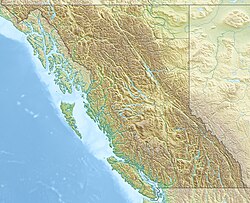| Tent Mountain | |
|---|---|
| Highest point | |
| Elevation | 2,210 m (7,250 ft) [1] |
| Prominence | 500 m (1,600 ft) [1] |
| Listing | |
| Coordinates | 49°33′26″N114°42′31″W / 49.55722°N 114.70861°W [2] |
| Geography | |
| Country | Canada |
| Provinces | Alberta and British Columbia |
| District | Kootenay Land District [3] |
| Topo map | NTS 82G10 Crowsnest [2] |
Tent Mountain is located on the border of Alberta and British Columbia on the Continental Divide. It was named in 1911 by Morrison P. Bridgland. [4] [1]
Tent Mountain hosts a legacy mountaintop removal coal mine, which closed in 1983. Approximately half of the "top" of Tent Mountain was removed to access the coal creating a large open-pit at the top of the mountain. The waste rock was left in a pile along the side of the mountain next to the open-pit. In 2021, a proposal was received to restart mining at the top of Tent Mountain. [5] The proposal has since been withdrawn.
A recent study of water quality both within the mine area and in rivers draining the mine revealed elevated concentrations of selenium. [6] Selenium concentrations downstream of Tent Mountain reached 185 μg/L in a pond below the mine spoil pile, and up to 23 μg/L in Crowsnest Creek, which drains the pond and the mine property. Crowsnest Creek in turn flows into Crowsnest Lake.


